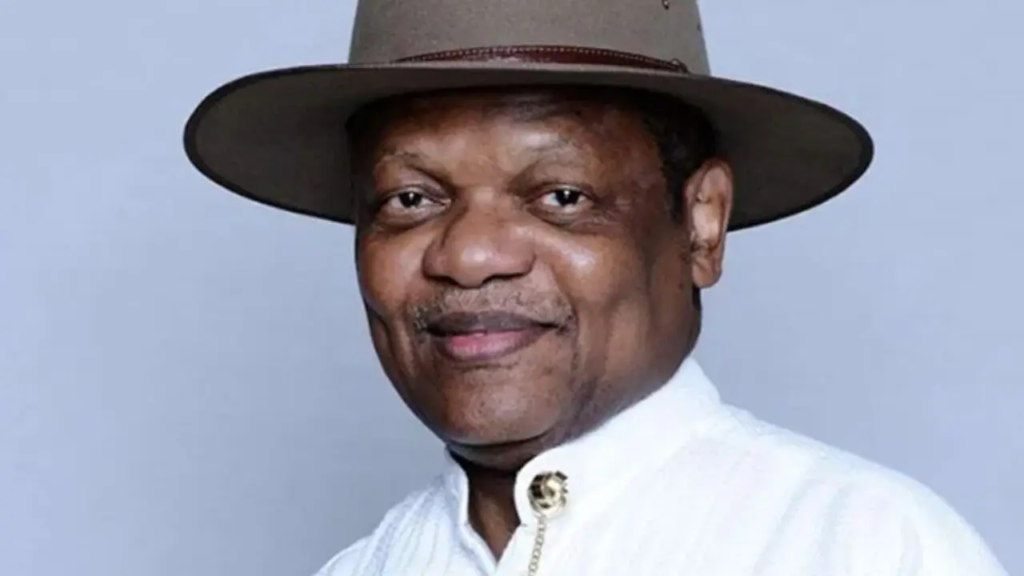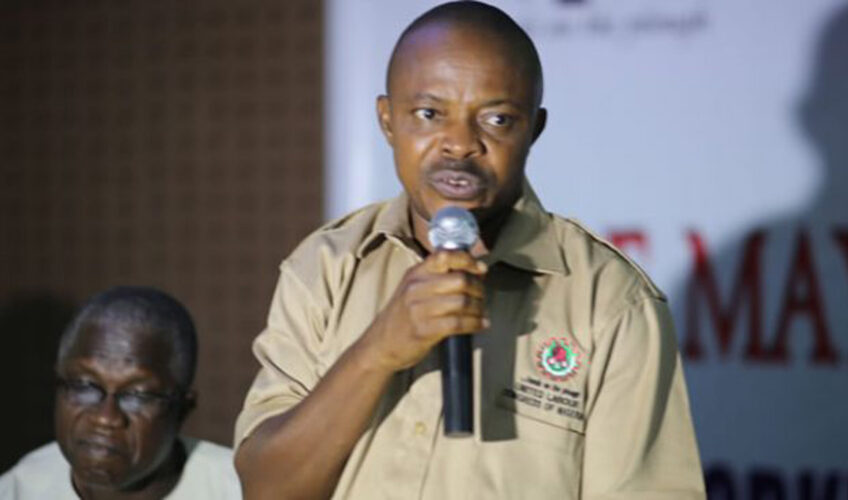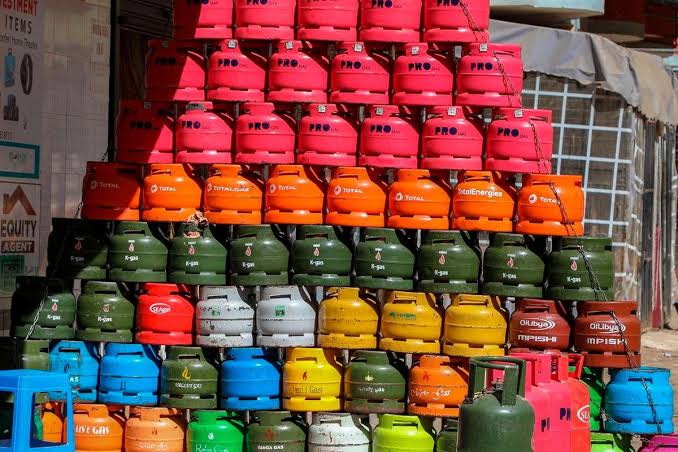- N5bn Palliative Package Cannot Cater to Over 133 Million Impoverished Nigerians – NLC
- ECOWAS Defense Chiefs Finalize Plans for Niger Military Intervention
- President Tinubu Greenlights Compressed Natural Gas Initiative
- CBN Unveils Fresh Operational Guidelines for Forex Transactions by BDC Operators
- ‘All Eyes On The Judiciary’ Slogan Not Offensive – Atedo Peterside
Across Nigeria’s 36 states and the Federal Capital Territory, these are the five top Nigerian news stories you shouldn’t miss
N5bn Palliative Package Cannot Cater to Over 133 Million Impoverished Nigerians – NLC
In a recent interview on Channels Television’s “Politics Today” show, Joe Ajero, the President of the Nigerian Labour Congress (NLC), expressed skepticism about the effectiveness of the Federal Government’s N5 billion palliative package per state. Ajero emphasized that when distributed among the vast population of over 133 million Nigerians living in multidimensional poverty, the proposed amount would translate to a meager N1500 per person.
Citing data obtained from the National Bureau of Statistics, Ajero argued that the N185 billion allocated for this initiative would hardly make a significant impact on the lives of such a large number of impoverished individuals. He went on to stress that even if the funds were converted into the value of six trailers of rice, the distribution would still amount to less than a cup of rice per person.
The labor union leader highlighted the dire situation faced by many Nigerians, particularly in the context of increasing petroleum prices. He pointed out that a substantial number of citizens had slipped further into the depths of poverty between the first and last increments of petrol pump prices.
Ajero’s skepticism extended to the potential impact of the N185 billion palliative, whether perceived as a one-time assistance or a loan. He questioned the significance of such an amount, especially considering the National Bureau of Statistics’ report that over 133 million Nigerians lived in multi-dimensional poverty.
“From the first increase in pump price of petrol and the last one, a lot of people moved from the borderline to a very high level of poverty. If you calculate and do an arithmetic on that, you will discover that it won’t amount to N1500 per person and you ask if that’s the impact that we want to achieve,” Ajero explained.
The NLC President’s remarks underscore the ongoing debate about the sufficiency of government interventions to address the significant challenges faced by impoverished citizens. As the discourse on social welfare and poverty alleviation continues, concerns about the tangible impact of such financial allocations on the lives of millions remain at the forefront.
ECOWAS Defense Chiefs Finalize Plans for Niger Military Intervention

The Committee of Chiefs of Defence Staff from the Economic Community of West African States (ECOWAS) has reported the refinement of its military intervention strategies in Niger Republic, in response to the ongoing political turmoil following the ousting and detention of President Mohamed Bazoum in a coup on July 26.
In a collective agreement, ECOWAS acknowledged the possibility of resorting to force as a final option if diplomatic initiatives fail to restore President Bazoum to power. The military junta that took control has defied ECOWAS’ deadline to relinquish power, prompting the deployment of standby military troops by the regional bloc last week.
A significant development emerged on Thursday, as ECOWAS announced the commencement of the activation of its standby force within Niger Republic, with the aim of reinstating constitutional order. The bloc also revealed its intention to convene a meeting of defence chiefs in Accra, Ghana’s capital, to finalize the intervention’s operational plans.
Abdel-Fatau Musah, ECOWAS Commissioner for Political Affairs, Peace, and Security, revealed during the closing ceremony of a two-day meeting on Friday that the defense chiefs had reached an agreement on the intervention’s timing.
Musah reaffirmed ECOWAS’ commitment to peaceful engagement with Niger’s military leaders, stating, “We are ready to go anytime the order is given. The D-day is also decided. We’ve already agreed and fine-tuned what will be required for the intervention. As we speak, we are still readying [a] mediation mission into the country, so we have not shut any door.”
He emphasized the regional body’s preparedness to take action if all other avenues fail, noting, “Let no one be in doubt that if everything else fails, the valiant forces of West Africa, both the military and the civilian components, are ready to answer the call of duty.”
The new military junta in Niger has faced international pressure from entities such as the United States, France, the United Nations (UN), and the African Union (AU) to reinstate President Bazoum. The coup leaders justified their actions by citing concerns over “bad governance and worsening security.”
As the political situation in Niger Republic continues to evolve, ECOWAS remains steadfast in its efforts to address the crisis through diplomatic means, while also ensuring that military intervention plans are meticulously formulated for a potential last-resort action.
President Tinubu Greenlights Compressed Natural Gas Initiative

President Bola Tinubu has given the green light for the establishment of the Presidential Compressed Natural Gas Initiative (PCNGI), a transformative effort designed to revolutionize Nigeria’s transportation landscape while mitigating the impact of fuel subsidy removal on citizens. This strategic move aims to reduce energy costs and contribute to the growth of the local economy.
According to a statement by Ajuri Ngelale, the Special Adviser to the President on Media and Publicity, the PCNGI embodies the President’s commitment to addressing the financial strain caused by fuel subsidy removal. By promoting the adoption of compressed natural gas (CNG), the initiative aims to enhance energy efficiency and affordability.
The PCNGI envisions the introduction of more than 11,500 CNG-enabled vehicles and 55,000 CNG conversion kits for existing vehicles that rely on premium motor spirit (PMS). Additionally, the initiative seeks to bolster in-country manufacturing, local assembly, and job creation in line with the directives of the President.
Ngelale emphasized that the Comprehensive Adoption Strategy of the initiative includes key components such as the Empowering Workshops Programme with a Nationwide Network of Workshops, Local Assembly, and Job Creation. The initial focus will be on mass transit systems and student hubs, with the objective of reducing transit costs for the public in the near term.
The PCNGI’s holistic approach also includes the establishment of workshops across all geopolitical zones and states, along with the provision of essential kits and comprehensive training for newly employed staff. This approach aims to enhance technical skill development, generate employment opportunities, and facilitate a seamless integration of CNG utility within the energy value chain.
The initiative aims to achieve multiple strategic objectives, including the development of new stakeholder-operated Intrastate Mass Transit systems based on CNG. The plan also includes support for states to incorporate CNG buses into their Intrastate Mass Transit networks, deployment of CNG buses through existing private transit operators, and creation of financing programs to incentivize investment in CNG processing, distribution, and utilization.
Furthermore, the President’s focus on assembling CNG-enabled vehicles within the country is poised to stimulate economic growth, create employment opportunities, and enhance Nigeria’s automotive manufacturing capabilities.
CBN Unveils Fresh Operational Guidelines for Forex Transactions by BDC Operators

In a significant development, the Central Bank of Nigeria (CBN) has revealed a comprehensive set of operational guidelines governing forex sales by Bureau de Change (BDC) operators within the country. This announcement comes after a hiatus of more than two years, during which the suspended CBN governor, Godwin Emefiele, had suspended foreign exchange sales to BDC operators operating in this segment of the forex market.
The newly introduced framework is designed to regulate the spread between buying and selling rates employed by BDC operators. This spread is now required to adhere to a permissible range of -2.5% to +2.5% of the Nigerian foreign exchange market window’s weighted average rate from the preceding day. This strategic move is anticipated to infuse greater stability and transparency into exchange rate fluctuations, benefiting both BDC operators and the general public.
In parallel, the apex bank has taken a proactive stance to address the issue of illegal financial operators (IFOs) in the country. The CBN has issued an advisory note to educate and protect the public against the potential hazards associated with Ponzi scheme operators and loan sharks.
Expressing growing concerns over the surge in illegal financial activities, the CBN articulated in a statement on its official website that these activities pose a significant risk to the integrity of the country’s financial system. To counteract this threat, the apex bank, through its Financial Services Regulation and Coordinating Committee (FSRCC), urges the public to exercise caution and refrain from engaging with unlicensed or illegal financial operators. These entities allure and defraud unsuspecting members of the public by offering abnormally high returns on investments.
This dual-pronged approach underscores the CBN’s commitment to enhancing the regulatory landscape in Nigeria’s financial sector. By introducing well-defined forex operational guidelines for BDC operators and disseminating awareness about the dangers of illegal financial operators, the central bank aims to ensure a more secure and transparent financial ecosystem for the nation’s citizens.
As the CBN continues its efforts to balance economic stability and consumer protection, these recent measures signify the evolving landscape of financial regulation in Nigeria.
‘All Eyes On The Judiciary’ Slogan Not Offensive – Atedo Peterside

Atedo Peterside, the founder of Stanbic IBTC Bank Plc and Anap Foundation, has stepped forward to voice his perspective on the recent controversy surrounding the “All Eyes On The Judiciary” slogan displayed on billboards across Nigeria. Peterside asserts that the slogan, which has been the center of attention and debate, is far from being offensive.
The Advertising Regulatory Council of Nigeria (ARCON) recently issued an order for the removal of billboards featuring the “All Eyes On The Judiciary” messaging. The billboards, sponsored by a group named “Diaspora’s for Good Governance,” were erected as the presidential election tribunal gets ready to announce its verdict on the petitions challenging the legitimacy of President Bola Tinubu’s victory in the general election.
ARCON’s actions went beyond the removal order; the organization also dissolved its Advertising Standards Panel and suspended the director and deputy director of regulations for their approval of the billboards linked to the presidential election petition tribunal.
In a tweet shared on Friday, Atedo Peterside expressed his perspective on the matter. He stated, “For the record, methinks #AllEyesOnTheJudiciary is a neutral slogan that should ordinarily not offend a right-thinking and sincere person in a civilized society.”
Peterside went on to elaborate on his viewpoint, highlighting that the slogan, in his opinion, should not be deemed offensive within the context of a civilized society. He drew a distinction between this neutral message and a negative or derogatory slogan that might be more legitimately considered offensive.
The controversy over the “All Eyes On The Judiciary” slogan underscores the nuanced nature of public discourse, particularly in the lead-up to significant legal decisions.















